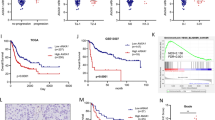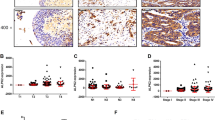Abstract
Bladder cancer is the second most common urological malignancy around the world and is by far the most frequent urological malignancy in China. The abnormal expression of sphingosine kinase 2 (SphK2) is associated with tumor progression and a poor patient survival rate, however, the effect of SphK2 on the bladder cancer cells remains unclear. The aim of the paper was to study the expression of SphK2 in bladder cancer and the role of SphK2 on the cell proliferation, metastasis, and apoptosis in bladder cancer in vitro. Our results showed that SphK2 is up-regulated in bladder cancer tissues compared with the corresponding adjacent non-neoplastic tissues, and the expression level of SphK2 was significantly higher in human bladder cancer cells in comparison with normal bladder epithelial cells. Silencing of SphK2 could inhibit the proliferation ability of T24 cells in vitro. In addition, SphK2 knockdown could induce a significant increase in the number of apoptotic cells. Furthermore, the transwell assay also showed significant cell migration inhibition in SphK2 siRNA transfectant compared with cell lines transfected with NC. Thus, this study suggested that SphK2 inhibition may provide a promising treatment for bladder cancer patients.




Similar content being viewed by others
References
Siegel R, Naishadham D, Jemal A. Cancer statistics. CA Cancer J Clin. 2013;63:11–3.
Suriano F, Altobelli E, Sergi F, Buscarini M. Bladder cancer after radiotherapy for prostate cancer. Rev Urol. 2013;15:108–12.
von der Maase H, Sengelov L, Roberts JT, Ricci S, Dogliotti L, Oliver T. Long-term survival results of a randomized trial comparing gemcitabine plus cisplatin, with methotrexate, vinblastine, doxorubicin, plus cisplatin in patients with bladder cancer. J Clin Oncol. 2005;23:4602–8.
Shirodkar SP, Lokeshwar VB. Potential new urinary markers in the early detection of bladder cancer. Curr Opin Urol. 2009;19:488–49.
Ploeg M, Aben KK, Kiemeney LA. The present and future burden of urinary bladder cancer in the world. World J Urol. 2009;27:289–93.
Hannun YA, Obeid LM. Principles of bioactive lipid signalling: lessons from sphingolipids. Nat Rev Mol Cell Biol. 2008;9:139–50.
Shida D, Takabe K, Kapitonov D, Milstien S, Spiegel S. Targeting SphK1 as a new strategy against cancer. Curr Drug Targets. 2008;9:662–73.
Oskeritzian CA, Alvarez SE, Hait NC, Price MM, Milstien S, Spiegel S. Distinct roles of sphingosine kinases 1 and 2 in human mast-cell functions. Blood. 2008;111:4193–200.
Liu H, Chakravarty D, Maceyka M, Milstien S, Spiegel S. Sphingosine kinases: a novel family of lipid kinases. Prog Nucleic Acid Res Mol Biol. 2002;71:493–511.
Yang GL, Zhang LH, Bo JJ, Huo XJ, Chen HG, et al. Increased expression of HMGB1 is associated with poor prognosis in human bladder cancer. J Surg Oncol. 2012;106:57–61.
Miller AV, Alvarez SE, Spiegel S, Lebman DA. Sphingosine kinases and sphingosine-1-phosphate are critical for transforming growth factor beta-induced extracellular signal-regulated kinase 1 and 2 activation and promotion of migration and invasion of esophageal cancer cells. Mol Cell Biol. 2008;28:4142–51.
Gao P, Smith CD. Ablation of sphingosine kinase-2 inhibits tumor ell proliferation and migration. Mol Cancer Res. 2011;9:1509–19.
French KJ, Zhuang Y, Maines LW, Gao P, Wang W, Beljanski V, et al. Pharmacology and antitumor activity of ABC294640, a selective inhibitor of sphingosine kinase-2. J Pharmacol Exp Ther. 2010;333:129–39.
Gestaut MM, Antoon JM, Burow ME, Beckman BS. Inhibition of sphingosine kinase-2 ablates androgen resistant prostate cancer proliferation and survival. Pharmacol Rep. 2014;66:174–8.
Van Brocklyn JR, Jackson CA, Pearl DK, Kotur MS, Snyder PJ, Prior TW. Sphingosine kinase-1 expression correlates with poor survival of patients with glioblastoma multiforme: roles of sphingosine kinase isoforms in growth of glioblastoma cell lines. J Neuropathol Exp Neurol. 2005;64:695–705.
Igarashi N, Okada T, Hayashi S, Fujita T, Jahangeer S, Nakamura S. Sphingosine kinase 2 is a nuclear protein and inhibits DNA synthesis. J Biol Chem. 2003;278:46832–9.
French KJ, Schrecengost RS, Lee BD, Zhuang Y, Smith SN, Eberly JL, et al. Discovery and evaluation of inhibitors of human sphingosine kinase. Cancer Res. 2003;63:5962–9.
Acknowledgments
This work is supported by the National Natural Science Foundation of China, 81402095; and the Science and Technology Foundation of Tianjin Public Health Bureau, 2013KZ110
Conflicts of interest
None
Author information
Authors and Affiliations
Corresponding author
Additional information
The Publisher and Editor retract this article in accordance with the recommendations of the Committee on Publication Ethics (COPE). After a thorough investigation we have strong reason to believe that the peer review process was compromised.
An erratum to this article is available at http://dx.doi.org/10.1007/s13277-017-5487-6.
About this article
Cite this article
Sun, E., Zhang, W., Wang, L. et al. RETRACTED ARTICLE: Down-regulation of Sphk2 suppresses bladder cancer progression. Tumor Biol. 37, 473–478 (2016). https://doi.org/10.1007/s13277-015-3818-z
Received:
Accepted:
Published:
Issue Date:
DOI: https://doi.org/10.1007/s13277-015-3818-z




